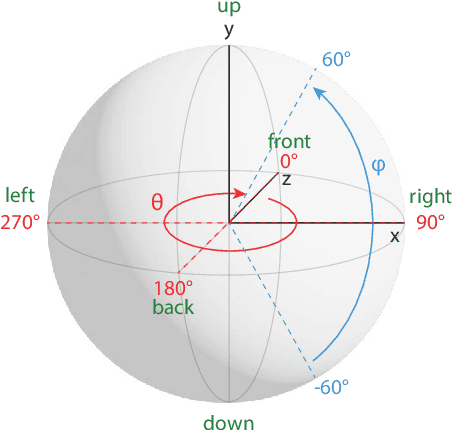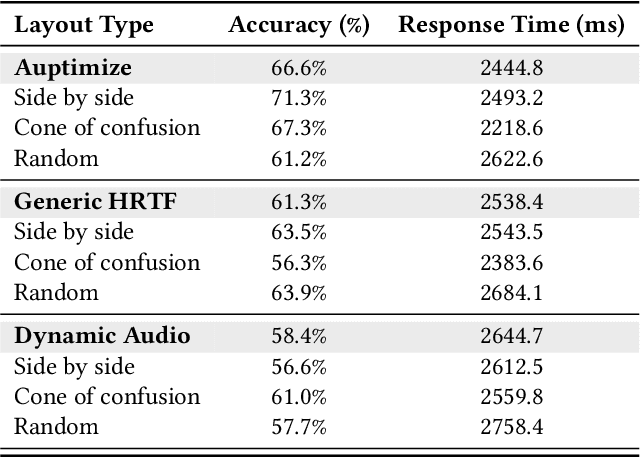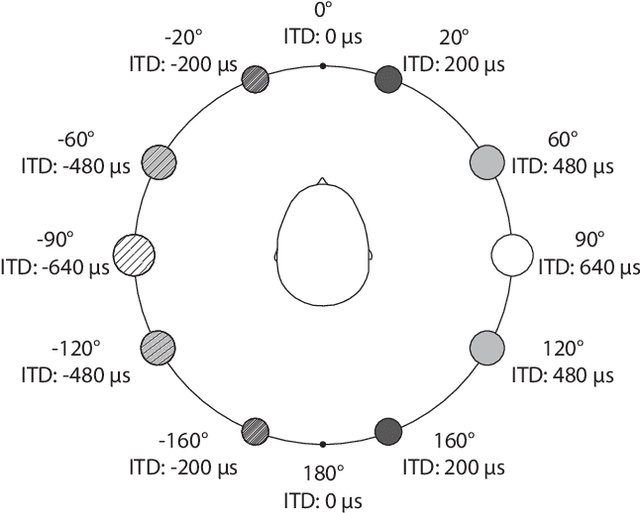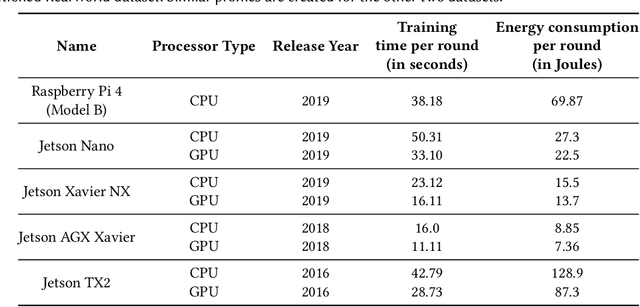Hyunsung Cho
Simulating Human Audiovisual Search Behavior
Feb 02, 2026Abstract:Locating a target based on auditory and visual cues$\unicode{x2013}$such as finding a car in a crowded parking lot or identifying a speaker in a virtual meeting$\unicode{x2013}$requires balancing effort, time, and accuracy under uncertainty. Existing models of audiovisual search often treat perception and action in isolation, overlooking how people adaptively coordinate movement and sensory strategies. We present Sensonaut, a computational model of embodied audiovisual search. The core assumption is that people deploy their body and sensory systems in ways they believe will most efficiently improve their chances of locating a target, trading off time and effort under perceptual constraints. Our model formulates this as a resource-rational decision-making problem under partial observability. We validate the model against newly collected human data, showing that it reproduces both adaptive scaling of search time and effort under task complexity, occlusion, and distraction, and characteristic human errors. Our simulation of human-like resource-rational search informs the design of audiovisual interfaces that minimize search cost and cognitive load.
Auptimize: Optimal Placement of Spatial Audio Cues for Extended Reality
Aug 18, 2024



Abstract:Spatial audio in Extended Reality (XR) provides users with better awareness of where virtual elements are placed, and efficiently guides them to events such as notifications, system alerts from different windows, or approaching avatars. Humans, however, are inaccurate in localizing sound cues, especially with multiple sources due to limitations in human auditory perception such as angular discrimination error and front-back confusion. This decreases the efficiency of XR interfaces because users misidentify from which XR element a sound is coming. To address this, we propose Auptimize, a novel computational approach for placing XR sound sources, which mitigates such localization errors by utilizing the ventriloquist effect. Auptimize disentangles the sound source locations from the visual elements and relocates the sound sources to optimal positions for unambiguous identification of sound cues, avoiding errors due to inter-source proximity and front-back confusion. Our evaluation shows that Auptimize decreases spatial audio-based source identification errors compared to playing sound cues at the paired visual-sound locations. We demonstrate the applicability of Auptimize for diverse spatial audio-based interactive XR scenarios.
FLAME: Federated Learning Across Multi-device Environments
Feb 17, 2022



Abstract:Federated Learning (FL) enables distributed training of machine learning models while keeping personal data on user devices private. While we witness increasing applications of FL in the area of mobile sensing, such as human-activity recognition, FL has not been studied in the context of a multi-device environment (MDE), wherein each user owns multiple data-producing devices. With the proliferation of mobile and wearable devices, MDEs are increasingly becoming popular in ubicomp settings, therefore necessitating the study of FL in them. FL in MDEs is characterized by high non-IID-ness across clients, complicated by the presence of both user and device heterogeneities. Further, ensuring efficient utilization of system resources on FL clients in a MDE remains an important challenge. In this paper, we propose FLAME, a user-centered FL training approach to counter statistical and system heterogeneity in MDEs, and bring consistency in inference performance across devices. FLAME features (i) user-centered FL training utilizing the time alignment across devices from the same user; (ii) accuracy- and efficiency-aware device selection; and (iii) model personalization to devices. We also present an FL evaluation testbed with realistic energy drain and network bandwidth profiles, and a novel class-based data partitioning scheme to extend existing HAR datasets to a federated setup. Our experiment results on three multi-device HAR datasets show that FLAME outperforms various baselines by 4.8-33.8% higher F-1 score, 1.02-2.86x greater energy efficiency, and up to 2.02x speedup in convergence to target accuracy through fair distribution of the FL workload.
 Add to Chrome
Add to Chrome Add to Firefox
Add to Firefox Add to Edge
Add to Edge